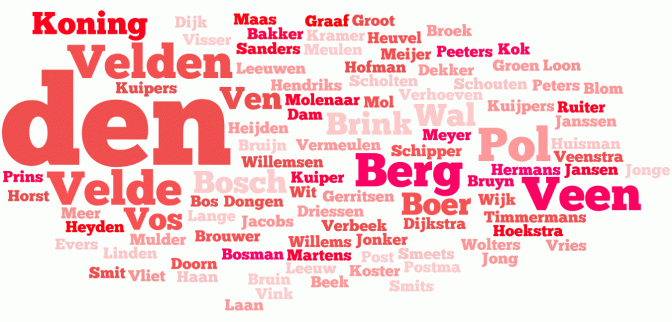The prefix “de” in a name can be confusing. It means “the” in Dutch but can also mean “de” in French.
People who have done Huguenot research often assume a “de”-name indicates a French or Huguenot origin. But when you’re dealing with a Dutch family, think horses not zebras: your Dutch ancestor with a “de” name was probably Dutch.
The most popular Dutch “De”-names are:
- De Vries [the Frisian]
- De Jong/Jonge [the younger]
- De Boer [the farmer]
- De Groot [the great/tall]
- De Wit [the white]
- De Graaf [the count]
- De Haan [the rooster]
- De Bruin/Bruijn [the brown]
- De Ruiter/Ruijter [the horseman]
- De Lange [the tall one]
- De Vos [the fox]
- De Koning [the king]
- De Leeuw [the lion].

Name cloud of the 100 most popular names


My maiden name is deVries, and fifth great grandfather on my dad’s side came from Friesland and then they settled in North Holland. My mother and all of her ancestors came from Friesland, too.
Interesting! My late mother and her identical twin’s adoptive mother’s maiden name was “DeMent”. The DeMent family line was said to be French immigrants to St Mary’s County, Maryland, USA. While I’m not “blood kin” to the DeMent line, as my mom was adopted into that family at birth, I count them as my kinfolk through adoption. My father, however, from whom I get my birth surname “Jaquith”, was a Huguenot descendant, as, of course, I am. “Jaquith” is anglicized French (likely “Jaques” – amazing how common it is for many non-Jaquith folks to put a “c” when writing my surname to make it look French to them, as “Jacquith”). First Jaquith immigrant to Massachusetts Bay Colony in 1643 was Abraham Jaquith, whose marriage to Ann Jordan was recorded in Charlestown, MA, that year. “Jordan” is a French name as well.